Peter MALONE
Saturday, 18 September 2021 19:51
Ali
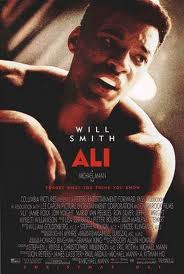
ALI
US, 2001, 157 minutes, Colour.
Will Smith, John Voight, Jamie Foxx, Mario Van Peebles, Ron Silver, Jeffrey Wright, Mykelti Williamson, Jada Pinkett Smith, Nona Gaye, Joe Morton, Michael Michelle, Paul Rodriguez, Bruce Mc Gill, Giancarlo Esposito, Barry Shabarka Henley.
Directed by Michael Mann.
There have been several films about Cassius Clay who became Mohammad Ali. He appeared in the 1970s film, The Greatest. Of greater interest is a more recent film in which he appears only in archival footage but of which he is the centre, Muhammad A;I’s Last Fight. It is the story of his being drafted, his refusal, his arrest, his career being put in abeyance by the licensing office, the court cases, going to the Supreme Court and the judgement in his favour. With a cast including Christopher Plummer and Frank Langela as members of the Supreme Court, the film with its discussions about the issues is very interesting.
This 2001 film was directed by Michael Mann, better known for action films and television series like Miami Vice. It is a starring opportunity for Will Smith who relishes the role. There is a very strong cast of African- American actors, especially with Mario Van Peebles appearing as Malcom X. The white cast is often impressive including Ron Silver as Ali’s coach and John Voight, unrecognisably made up, as sports commentator Howard Cossell.
The film is an overview of Cassius Clay turning into Muhammad Ali and his life between the mid-60s and the mid-70s when he defeated George Frazier in Zaire in the Rumble in the Jungle.
The screenplay tends to focus on the boxing issues, the Islam issues, especially his conversion and his being ousted from the Nation of Islam by Elijah Muhammed. There are some indications of his personal life, his brash personality and banter, taunting his opponents, the impression of boasting. There is comparatively little on his personal life, marriage, relationships – though Will Smith’s wife, Jadar Pinkett Smith, does appear as one of the women in his life.
The film stands as a very interesting piece of Americana of the 1960s and 1970s.
1. The status of Muhammad Ali, audience knowledge of him, in his time and later? Attitudes towards him? His changing reputation in the United States, especially concerning the Vietnam war and conscription?
2. The film as a biopic, its impact? The work of the director, the strong cast, African- Americans?
3. The 1960s and 70s, United States society, the boxing world, champions? Politics, the committees, Martin Luther King, civil rights, protests? The Vietnam war, the draft? The courts and the Supreme Court? An interesting overview of Mohammad Ali’s career?
4. The locations, the American cities, the boxing world, bouts? The military? Africa and Zaire? The musical score? Songs of the period?
5. The performance of Will Smith, his impersonation of Ali? Mario Van Peebles and his impersonation of Malcom X? Other historical figures? John Voight as Howard Cossels?
6. The portrait of Cassius Clay, as a young boy, his brother, parents, his telling the story of the execution of the black man by wire, the effect on him? The article? His growing up, a blend of the clever and the ignorant? His patter, aggressive persona, the effect on opponents, on the public?
7. The focus on the young Cassius Clay, the scenes of training, his relationships, his wife, family, his brother? His relationships with women? The later wedding? Going to Africa, the fights?
8. Jamie Foxx, as Bundini, putting himself forward, supporting Ali over the years, his drinking, making peace with Ali?
9. Ron Silver as the coach, his devotion to Ali, perseverance, support?
10. The status of Howard Cossell at the time, sports commentator, his friendship with Ali, the television shows, the banter, his promoting Ali?
11. The portrayal of the different fights, the confrontation with Sonny Liston, weights, Clay’s banter, the carry on, the fight itself, the demands on him, the victory?
12. Malcolm X, his character, status, the Nation of Islam? The relationship with Elijah Muhammad, his philosophy? His son, Herbert, the influence on Clay? The conversion to Islam, the name of Mohammad Ali, with Elijah Muhammed, the ousting of Malcom, Malcolm’s visit to Nigeria, the invitation to Ali, Ali and the confrontation? Loyalties?
13. Elijah Muhammad expelling Ali? The gathering, the assassination of Malcom?
14. The issue of the draft, the atmosphere 1968, the American presence in Vietnam? Ali and his loud mouth, the reaction of the press? His saying no to conscription? The arrest? The drill, his refusing to step forward? The hearings, the lawyers and their support? His not being able to fight? The licence board and their decisions? Uncertainty over him?
15. The effect of the death of Malcom X? Herbert and his influence? The fights?
16. Ali in limbo, his career, the case going to the Supreme Court, at the meal, the news coming through, his victory?
17. The planning for the Rumble in the Jungle? George Frazier? Don King and his personality, the promotions, speeches, razzmatazz? With the press?
18. Politics, Africa, Zaire? The waiting, the preparation? Frasier and his injuries?
19. Intimations of Ali’s personal life, the collapse of his marriage? Children? Relationships with different women? The flirtation? Veronica, the encounter, the affair, his later marrying her, divorcing her?
20. The final bout, Ali winning? Champion of the world?
21. The succeeding years, his reputation, champion, losing, regaining the title? His place in the history of sport, boxing? His place in American history, an icon, for African- Americans? For Islam in America? His very personal, American-style serious and comic personality?
Published in Movie Reviews
Published in
Movie Reviews
Tagged under
Saturday, 18 September 2021 19:51
For Love or Money
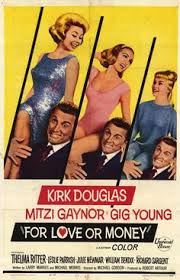
FOR LOVE OF MONEY
US, 1963, 108 minutes, Colour
Kirk Douglas, Mitzi Gaynor, Thelma Ritter, William Bendix, Gig Young.
Directed by Michael Gordon.
For Love of Money is an easygoing romantic comedy of the early '60s from Universal Studios. It seems very similar to the Rock Hudson- Doris Day style comedies, so popular at the time. In fact, star Kirk Douglas refers to Rock Hudson during the film.
Kirk Douglas shows a neat style of comedy. Mitzi Gaynor is an attractive heroine. There is enjoyable support from Thelma Ritter and William Bendix. Gig Young is there, yet again, as the best friend. Julie Newmar and Lesley Parrish are two sisters.
The film is one of those American fairy tales where the man preoccupied with money falls genuinely in love. It is one of those enjoyable American fairy tales. Direction is by Michael Gordon, director of the Doris Day- Rock Hudson Pillow Talk.
1.Enjoyable romantic comedy? Affluent San Francisco settings? The stars?
2.The atmosphere of the American city, affluence, big business? The musical score?
3.The title and its choices, and the fairytale touch?
4.Kirk Douglas and his comic style as Deke Gentry? The yacht, his Sunday off, lazing? The phone call, Mrs Brasher and her demands? His following orders? Hope for money? Taking the job, the interview with each of the sisters? Their not getting rid of him? His technique with Kate? The insinuations, criticism of her mother, her falling for the tricks and employing him?
5.Mrs Brasher and her style, the tough widow? Joseph as her adviser, detective? Pressure on Deke? Listening in on conversations? The lure of money, her bet with Joseph? Mrs Brasher and her relationship with her daughters, their resentment of her? Her plans for their marriages? Telling Gentry about the husbands and commissioning him to make the engagements? Kate's breakdown, weeping with her mother, Mrs Brasher's inability to help her? The happy reunion, the marriages?
6.Gentry and his manoeuvres, meeting each of the sisters, promising them money, arranging for the husbands-to-be to turn up? Timing, fostering the romances? The sisters and their turning to him? Kate and her resistance, her psycho-seduction and buyer motivation? The arrangements for the dinner with Sonny, the mistakes? Falling in love with her? Going to the boat, falling in the water? Her turning against him after discovering the report? The antagonism? With Sonny, the dinner and the fights? On the boat, everybody listening in on the radio? Falling in the water - and the reconciliation? The happy marriage? The change of heart in Gentry?
7.Kate, her wealth, antagonism towards gentry? Her work on motivation? Her collaborator, their film and people and their buying habits in supermarkets? Interest in Sonny? Willing to help Gentry, thinking that there was something wrong with him, trying to help, going to his apartment, seeing her sisters? Turning against him? Sonny and his courting her, the flowers and the invitation, the dinner and the dancing? Her seeing through him? At sea?
8.Sonny, the playboy, the women, the yacht, following Bonnie home, missing out on the dates? Friendship with Gentry? Attracted towards Kate, courting her? On the yacht? The clash between the two? His being the best man?
9.Bonnie, the body-building, Harvey and the tax returns, helping him, falling in love? Jan and her being way out, art and the San Francisco art scene, poking fun at it? Sam and his book about the prisoners? His clash with Jan, their falling in love?
10.The predictable situations, the verve of the writing and acting - and audiences enjoying this kind of predictable romantic comedy?
Published in Movie Reviews
Published in
Movie Reviews
Tagged under
Saturday, 18 September 2021 19:51
Beautiful Country, The
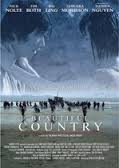
THE BEAUTIFUL COUNTRY
US, 2004, 125 minutes, Colour.
Damien Nguyen, Bai Ling, Nick Nolte, Tim Roth, Temuera Morrison.
Directed by Hans Petter Moland.
The Beautiful Country is a very moving film, a beautiful film about sadness and hope.
The film was directed by Hans Petter Moland, a Norwegian director of many quirky films including In Order of Disappearing. He brings great sensitivity to this story and the style of storytelling.
Damien Nguyen appears as Binh, son of a GI who disappeared soon after his birth and a local mother. In the aftermath of the Vietnam war, children of mixed race were looked down on. Binh has grown up in the countryside, away from his mother who works in Saigon, and he is treated badly by relatives and people in the village. They oust him and he makes his way to Saigon, trying to find his mother.
While all might have been well in Saigon, his mother works as a servant and is harassed by the son of the house. After an accident, it seems better that Binh and his stepbrother, Tam, should try to leave the country, which they do, making their way to Malaysia where they are interned in refugee camps.
For audiences wondering what it is like to be a refugee, a boat person, living in refugee camps with little hope of getting out, this film should be seen. After the escape from the camp, Binh and Tam, along with a Chinese woman, Ling, experience the exploitation of people smugglers. Life on the boat seems even worse than in the camps.
After arrival in the United States, the refugees are taken by truck to an unknown destination, finally reaching New York where they are exploited for their work in sweatshops. Binh eventually decides to go to Texas and search for his father – which he does with some unexpected twists to the story of his father.
Damien Nguyen carries the film as Binh. Bai Ling is the Chinese singer. Temuera Morrison is the people smuggler. Tim Roth is the captain of the ship. And at the end there is a fine performance by Nick Nolte as Binh’s father.
1. A beautiful and moving film? The lack of promotion and its not being seen?
2. Vietnam story, dating back to the war, the aftermath of the war, the GIs and their relationship with local women, the birth of children of mixed race, the introductory note about people looking down on these children, on the mothers? The consequences, migration, refugee status, camps in Malaysia, on the high seas, going to America? The search for parents?
3. The director, from Norway, his perspective and sensitivity?
4. The Vietnamese locations, the countryside, the villagers, the move to Saigon in 1990? The city, the streets, jobs, poverty, affluent families and their style? On the sea in the small boats, the visualising of the Malaysia camps, the interiors of the huts, the exteriors, the fences? The ship with the refugees, cramped spaces, on deck? The American locations, in New York City, the Vietnamese in servitude and servile jobs? The contrast with Texas, Houston, the countryside, the farm, the old hut? The musical score?
5. Binh’s story, the background of his birth, the photo with his parents, the disappearance of his father, with his family in the countryside, their spurning him, ousting him, his property, needing food, work? His decision to go to the city?
6. His search for his mother, enquiries, leads, her background as a hairdresser? His going to the shop? Gradually discovering her? The work in the house, servant, asking for a job for her son? His being given odd jobs? Her having a little boy? The sexual harassment from the son of the family, his attacks did, handling his mother? Lady of the house, her demands, wealth, the contrast with ordinary people? The vase, it’s breaking? The decision that Binh should leave? Leaving his mother? The document and the address of his father?
7. His escape, getting in the small boat, going out to see, the rescue from the ship? Sailing to Malaysia? The importance of taking his stepbrother, Tam? The bond between the two?
8. Life in the camp, the enthusiastic Chinese, his mental condition, his being killed? Meeting living, Ling, her being a refugee, the friendship with Tam? The girls in the camp, the prostitution, trying to save money? The men, the work, digging holes? The lack of food, Binh finding the rooster, preparing it for a meal? The authorities? Supervision? The hard life and people expecting to stay there?
9. The opportunity for Binh to leave, taking Tam, with Ling? The money? Getting through the fence, to the sea, being taken to the ship, the demands for money, the captain watching?
10. The people smuggler, his ruthlessness, demanding money, extra money for Tam and Ling? The captain allowing them on the boat? Going below, the cramped quarters? The storms, people dying, the bodies thrown overboard? The lack of food?
11. The captain, his attitude, his mission, his cargo, relationship with the people smuggler? The young man who tormented Binh, sending him to the end of the line? The captain, confronting him, threatening him? The captain’s interest in Binh, inviting into the caBinh, talking about his future? Yet strict with him? The people smuggler and the captain shooting him? Binhs seeing this? Tam, his getting sick, his death, his body overboard?
12. The arrival in the United States, the small boat, people hurrying onto the beach? The roundup, taken in trucks? Going to New York? A different atmosphere, the visuals of New York – as seen by the Vietnamese? The jobs in the sweat houses? Yet a certain amount of freedom to move around? Ling, the cafes, her singing, the men singing with her, the connections, prostitution? The man who is interested her as a person, to marry her, the meeting the cafe, Binh’s reaction?
13. Binh, surviving in New York, writing to get out? The decision to get Texas? His lack of money? The various opposite hitchhiking, friendly people, the Mexican family, the truck driver and his memories of being in Vietnam? His arriving at his father’s address, ringing the bell, the ex-wife and her antagonism, the dislike of her husband? Getting the police, Binh on the footpath, walking up and down, who finally giving him some information?
14. His travelling into the countryside? Going to the address? Meeting the manager, hearing something about his father Western Mark going to the hut? Not immediately realising he was blind?
15. Steve, blind, his work, excepting Binh, helping with the painting of the fence war? The meals, the bedroom, offering Binh the bed, in taking the mattress? They’re working together?
16. The revelation of the story, Steve’s love his wife, the marriage, his work, the explosion, waking up in America, blind? Not wanting his wife to support a blind man, his staying in America? He is passing, trying to get work?
17. The bond with Binh, Steve telling his story, memories of Vietnam, cooking Vietnamese meals, working together?
18. The end of the quest for Binh? A satisfying ending? The US is a beautiful country? Hopes for a future?
Published in Movie Reviews
Published in
Movie Reviews
Tagged under
Saturday, 18 September 2021 19:51
Hercules/ 1997
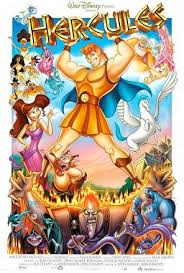
HERCULES
US, 1997, 92 minutes, Colour.
Voices of: James Woods, Rip torn, Samantha Eggar, Tate Donovan, Danny De Vito, Amanda Plummer, Bobcat Goldthwait, Matt Frewer, Roger Bart.
Directed by Ron Clements, John Musker.
From the more serious point of view, Hercules is one of the Disney Studios lesser films of the 1990s, especially in comparison with its predecessors including Beauty and the Beast, Aladdin, The Lion King. This is designed for sheer entertainment, very little message – except the old one to be true to oneself!
The film is geared for comedy, especially with the voice performance of James Woods as the arch-villain, Hades – whose patter and intonations sound like James Woods in most of his other films of the time! Tate Donovan is a rather calm and pleasant Hercules. Other voices include those of Danny DeVito?, Susan Egan, Roger Bart, Amanda Plummer Bobcat Goldthwait, Matt Frewer, Rip Torn and Samantha Eggar as Zeus and Hera, Hal Holbrook and Barbara Barrie as the adoptive parents.
Perhaps because of the success of the musical versions of the previous Disney films, this one is already designed as a musical. Taking the cue from the paintings on Greek vases, a group of singers come alive and serve as a chorus throughout the film. One of the oddities of the film is that one of the recurring lyrics in the film refers to the story about Hercules as “the gospel truth”! Nothing to do with the gospel – which makes it something and of an absurd lyric, especially where Christians sensitivities are concerned.
We are shown life on Mount Olympus, the experiences of the gods. Hercules is sent to earth for his own safety after threats from Hades, grows up with foster parents, gradually emerges with a great desire to return to his father and become a god again. However, as he performs all the labours of Hercules with visual and comic style, he falls in love and has to make the obvious decision at the end of the film – true love versus the comfort of divinity on Mount Olympus.
Hercules entertains in its way while it is on the screen – but is one of the least memorable of the Disney films of the period.
Published in Movie Reviews
Published in
Movie Reviews
Tagged under
Saturday, 18 September 2021 19:51
We Were Soldiers
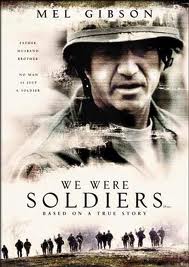
WE WERE SOLDIERS
US, 2002, 138 minutes, Colour.
Mel Gibson, Sam Elliott, Madeline Stowe, Greg Kinnear, Barry Pepper, Chris Klein, Keri Russell, John Hamm, Clark Gregg.
Directed by Randall Wallace.
We Were Soldiers comes rather late in the day in terms of films about the Vietnam war. Though there was an initial reluctance, by the end of the 1970s, and the fall of Saigon, the American industry made The Deer Hunter, Coming Home, Apocalypse Now. There was a reluctance to think about what became a very unpopular war, with the draft, and a defeat, and the loss of many American lives.
By 2002, it seemed a good thing to make a film like this. It is based on the memoir by the central character, Hal Moore, played with great intensity by Mel Gibson, almost icon-like, a fierce leader, loyal to troops, willing to lay down life for troops, yet a devoted husband and father, religiously devout, even to kneeling down and saying prayers.
The film opens with a prologue, the Vietnamese fighting the French and the defeats of 1954, leading ultimately to American intervention at the end of the key Kennedy era and through the presidency of Lyndon Johnson,. this film builds up to the first major battle between the Americans and the Vietnamese, the strategic preparations, for instance the establishing of an ambulance service to take the wounded from the battlefields by helicopter. It also shows the choosing of howl bought to be in charge, the store which lists of his World War II and Korea War veteran officer, Plumley, played with his staunch strength by Sam Elliott. There is the picking of the men, the training of the men, the preparation for war.
There are also family scenes, with Madeleine Stowe as Moore’s wife, and young newlyweds played by Chris Klein and Keri Russell, with Klein’s character questioning Moore about God’s plan and the sadness for Moore’s wife to have to deliver the news that her husband had died in action.
The battle scenes are vividly handled, quite intense, very much for the Americans but the film also shows a great number of sequences for the effect of the war on the Vietnamese themselves. And the film shows a great deal of loss of life on both sides.
The screenplay was written by Randall Wallace, who wrote Braveheart as well as Pearl Harbor and moved into direction with The Man in the Iron Mask, then this film. Later, he was to make Heaven is for Real.
1. A significant Vietnam war film? Not from the period when the films were made but rather the beginning of the 21st century? The status of Vietnam veterans at the time of the war and immediately afterwards? The changing perspective? The finale with Moore going to the Vietnam Memorial in Washington DC and the list of the names before the final credits?
2. The screenplay based on the book by Hal Moore? Authentic? About the military, about command, about training, about strategies and tactics, about loyalty to the men, about leadership, about action in battle, woundings and deaths, the aftermath of battles?
3. The importance of the war sequences, the film building up to them, the selection of the men, the training, the plans about the helicopters, going to Vietnam, the terrain, the firepower, the visuals of the fighting, shooting, explosions, fire from the air? The audience placed in the middle of the battles? The men, bravery, saving others, being shot, Joey, the photographer, the glimpses of his photos, his being put into action, his final words to Moore and reassuring him?
4. The strategists at the Pentagon, their plans, the helicopters, the choice of Moore, his reputation? His meeting with Snake, friendship, the discussions about the helicopters and the training? Later seeing Snake in action in Vietnam?
5. The men, the speeches, the presence of Plumley, his reputation, toughness, experience? The scenes of the training? The demands of the men?
6. War, at home, his wife, five children, kneeling for prayer, Julie being a Methodist, yet prayer for every intention? Love for his wife? His discussions with Jack, about God’s plan? Wearing the chain with his daughter’s name? Jack in command, his support of his men, his death, Moore taking the chain, delivered to Barbara? Her pregnancy, grief?
7. The scene with all the wives, their discussions, practicalities at the base? The woman misreading the laundry and the word, white The discovery of the racism? The response of the black woman – at the time of the Civil Rights movement?
8. The bulk of the film in Vietnam, the vividness of the war sequences? For the Americans? Desperation? Reinforcements? Airpower? The fire, the burning of the Americans, collateral damage, putting them in the helicopters?
9. The presentation of the Vietnamese, in battle, their strategies, weaponry, shooting, offices, being defeated by American weapons, the final defeat, the officer, the tunnels, the Vietnamese document, the photo of the wife? The glimpse of her at home and the news of the deaths?
10. The role of the photographer, in action, having to take up or weapon? The end of the battle, the swarm of journalists and their approaching Moore, his lack of answers for them?
11. The significance of this film in the American consciousness – and its release only months after 9/11?
Published in Movie Reviews
Published in
Movie Reviews
Tagged under
Saturday, 18 September 2021 19:51
Augustine
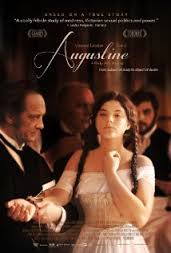
AUGUSTINE
France, 2012, 102 minutes, Colour.
Vincent Lindon, Soko, Chiara Mastroianni.
Directed by Alice Winocour.
Doctor Jean- Martin Charcot was a pioneer in, possibly the founder of studies in neurology for patients suffering symptoms of hysteria. His main client was a teenage maid, Augustine, who was subject to seizures. He treated her and decided that he would present her as a case study for the French Academy. His demonstration was accepted and he was congratulated.
The film introduces Augustine and her work in an affluent house, serving meals to guests, but having a seizure during her work and the consternation amongst the guests. She goes to Doctor Charcot who becomes very interested in her case, relying on his associates, and the capacities for inducing hypnosis in one of his assistants. There are many scenes of the film of her having seizures, some of them part of her experience, others induced. Ultimately, the doctor decides that he should present her as a case study to the French Academy and a backup for his theories and neurological developments.
There is some background story to the film, the tension in his marriage and the support of his wife as well as her feeling distant as well as his unprofessional sexual encounter with his client. He is played by Vincent Lindon, his wife by Chiara Mastroianni. Augustine herself is played by the popular French singer Soko. There is a feminine, even feminist, sympathy and sensibility in the film, written and directed by Alice Winocor.
1. The historical background of this story? The research and work of Doctor Charcot? His interest in neurology, in hysteria, in seizures, in hypnosis? Augustin as his case study for the French Academy?
2. The style of the film, the visuals, the mansion and the meals, the kitchen? The streets? The transition to Doctor Charcot’s office? The scenes at his home? The Academy and its meetings? The musical score?
3. Augustine, her age, working as a maid, serving the meals, in the kitchen, her collapse, her seizure, the family reaction? Her inexperience? Going to Doctor Charcot? The sessions, the treatment, his questioning, the seizures, induced seizures, hypnosis? The effect on her? The effect on her relationship with the doctor? The sexual aspect, his taking advantage of her? The consequences for her? For him? Personally? Professionally? For his wife?
4. The character of the doctor, his eminence, his work, laboratories, theories on hysteria, neurological theories? The discussions with his colleagues, his assistant? The plan for the Academy? The preparation, his personal relationship with Augustin? The presentation, the hypnosis? His explaining how susceptible she was? The interest of the audience? Augustine and the authentic seizure, her capacity for feigning the seizure? The performance at the Academy? The hesitation, their applause, Charcot and his future, financial support, medical work, reputation?
5. The background of his home life, his relationship with his wife, her being at home, somewhat estranged, yet supportive, her wariness about Augustine?
6. A French glimpse into aspects of French medical history?
Published in Movie Reviews
Published in
Movie Reviews
Tagged under
Saturday, 18 September 2021 19:51
Galore
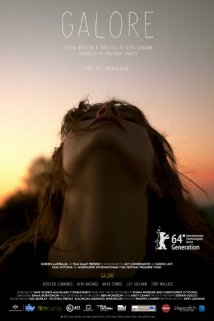
GALORE
Australia, 2014, 100 minutes, Colour.
Ashleigh Cummings, Lilly Sullivan, Toby Wallace, Maya Stange.
Directed by Rhys Graham.
It is summer in Canberra, the summer of 2008, the summer of the bushfires which came into the city suburbs and destroyed homes and took four lives. Throughout the film, the camera notices the columns of smoke in the far distance, then the approach of the fires and finally the city and its people surprised by the extent of the devastation.
The approach of the fires and their destruction – and purging – might serve as something of a motif for the mood of this film and its portrait of teenagers in an idle summer.
There are four characters at the centre of the film, principally a young girl, Billie, played with some force, even dominance by Ashleigh Cummings. She has been friends with Laura, Lilly Sullivan, since they were very young but now the moods and crises of teenage have caught up with them. Danny (Toby Wallace) is Laura’s boyfriend but right from the beginning we see him passionately kissing Billie. Billie is no slouch at flirting and going further. Laura, on the other hand, is somewhat restrained, inveterate writer in her diary, discussing with Billie just what she should do about a sexual relationship.
Into the group comes Isaac, an Islander living in a shelter where Billie’s mother does charitable work. She has pity on Isaac and brings him home to live in the caravan on the property, much to Billie’s displeasure. However, he is drawn into the group and their activities with the other teenagers with nothing to do and virtually nowhere to go except to dams and waterholes. A focal point of their partying is New Year Eve.
As the days draw on with sunbaking, swimming, needling each other, conversations, walks… Billie drinks too much, clashes with Danny, is caught up in her relationship with Laura and takes a car owned by some of the other boys and goes on a reckless drive which has, of course, some dire results.
This film is well made, the performances good. However, one of the difficulties is that we see what the characters do but often, very often, it is hard to appreciate what is motivating them. This applies even to Billie and her behaviour, the audience having to observe her and try to work out what is driving her. There is some motivation in Laura, especially as she becomes infatuated with Isaac, with a sensual scene between the two of them. Hardest to know what is driving Danny or whether he is simply going with the flow.
Later in the film there is a funeral sequence with the parents of one of the group speaking about their child – but indicating that they knew very little about their child. This is mostly true even of Billie’s mother, good-natured and trusting rather than really knowing what was happening with her daughter.
Admittedly, this is not a treatise on the behaviour of adolescents. Rather, it is a portrait of four young people over a short space of time. The frequently self-absorbed Billie has to come to terms with her life, face up to some responsibility for what she has done. Her experiences are something like the fire which swoops down on the city, burns and destroys – and perhaps purges enough so that there could be a better rebuilding.
1. An Australian story about teenagers? Universal story? Life as a mess, adolescents being just kids? A cautionary tale?
2. The Canberra settings, homes, caravans, the dams, roads, the hospital, buses and cars? Authentic atmosphere? For an idle summer for teenagers?
3. The bushfires, the reality of 2008? Continual smoke being seen, the threat, the danger, the power of destruction? Information about the houses destroyed, lives lost? The symbol of what was happening for the central characters? The details as described in Laura’s diary?
4. The title, with reference to the characters? Their lifestyle?
5. The focus on Billy, her age, character, relationship with her mother, absent father? Self-absorbed? Her relationship with Danny, the long opening kiss, the other sex sequences, her focus on sex? A long friendship with Laura, the discussions, urging Laura in her sexual experiences? The other friends, their sharing? Billie as a leader – or being led? The activities, the New Years Eve party, swimming and sunbaking, flirting? Her mother bringing Isaac and putting him in the caravan? Antagonism towards him? Her criticisms of her mother’s social and charity work? With other boys, the young boy devoted to her? Her moods, attitude towards Danny? Working in the pizza parlour, being late? Confiding in Laura, drinking? Mad behaviour, taking the car, the reckless driving, the fear for the passengers, swerving to avoid the kids on the road, leaving the car, Laura and her injury, Billie’s concern? Watching Laura with Isaac, waiting for them? In the bus, Laura getting out, the collapse, hospital, death, Billie’s reaction? The responsibility? Going to the police or not? The boys whose car was stolen, their confronting Billy on the bridge of the dam? Isaac giving Laura’s diary to Billie, reading it, writing her love in it? Her regrets? The fires, leaving with her mother, taking the diary, being turned back by the police? Billie and developing a sense of responsibility, looking beyond herself? Her talk with the young boy devoted to her? The theme of the fires – and the possibility of purging and rebuilding?
6. Laura, her friendship? Sharing things together? Her lack of sexual experience? The sleepovers in the house? Joining in the activities, the attraction to Isaac, the diary? In the, the crash? The attraction towards Isaac, in the cameraman, asking to see him? The sexual response? In the bus, her collapse, her death?
7. Danny, his age, the infatuation with Billie, how much love, the preoccupation with sex? His maturity, immaturity? Billie on and off with him? Attitudes towards Laura? In the car, his upset? Skateboarding? At the funeral, attitude towards Billie, in the car with her, at the end?
8. Isaac, Billie’s mother and bring him from the centre, to the caravan? An Islander? His love of reading? His friend’s clash with Billie? Sharing with the youngsters, being urged to go out, Billie’s spurning him at first, sharing with Laura, the attraction, the swims, in the car, reckless, the crash, giving Billy the diary, the sex scene with Laura?
9. The glimpse of Billy’s mother, relationship with her daughter, her social concern?
10. The parents at the funeral, the speech by Laura’s parents – and their not knowing what was happening to their children?
11. Kids, idle, holidays, summer, immature behaviour, reckless and irresponsible, limited experience? The steps on their great maturity?
Published in Movie Reviews
Published in
Movie Reviews
Tagged under
Saturday, 18 September 2021 19:51
Transformers: Age of Extinction
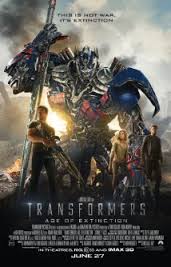
TRANSFORMERS: AGE OF EXTINCTION
US, 2014, 165 minutes, Colour.
Mark Wahlburg, Nicola Peltz, Stanley Tucci, Kelsey Grammar, John Reynor, Sophia Miles,
Voices of: Peter Cullen, John Goodman,
Directed by Michael Bay.
It’s not quite true to say, seen one Transformers movie, seen them all. Yes, there is a great deal of similarity in plots and characters in the first three films, but this one begins with a more human touch than usual.
Admittedly, there has already been a battle with the destruction of the city of Chicago, the Decepticons wreaking havoc on humans and buildings. And the retiring CIA chief, played with a villainous relish by Kelsey Grammar, is involved in secret plots to rid the world completely of Transformers. He sees himself as the complete Patriot, with hawkish no tolerance of Transformers.
In fact, the Autobots have been vanquished, have disappeared, in hiding, especially their leader Optimus Prime (voiced by Peter Cullen). Fortunately for the plot of the film, he is hiding in Texas, disguised as a truck in a huge vintage cinema which is in a state of decay. Cade Yeager, an imaginative but impoverished technical inventor (played by Mark Wahlburg in his usual down-to-earth style) buys equipment as well as the old truck that he has discovered. Into the story comes his daughter, Tessa (Nicola Peltz) and his longtime friend, Lucas (T.J.Miller). There is a reward for finding Transformers and Lucas is interested in it, even phoning the authorities – but, unfortunately, linking up with the CIA secret surveillance for Transformers. And in they come, in mass force, being watched by the CIA Director on massive screens, drawing on negotiation skills which have no effect and then resorting to weaponry, mass weaponry.
This begins a series of chasers, raids, assembling of Autobots, one sounding like John Goodman and looking like him as a bearded cigar-chomping warrior, help from Optimus, the gathering together of the Transformers and the discovery of the lengths of plotting by the CIA Director.
Enter an entrepreneur, Joshua (Stanley Tucci) who has the largest laboratories we have ever seen, working on reconstructing Transformers, in possession of transformium, discovered in the Arctic – the audience has seen in a prologue how the Transformers defeated the dinosaurs millions of millennia back – and the CIA hopes to defeat all Transformers with the aid of these controlled reconstructions.
There has to be a confrontation, of course, and that happens in Chicago, an extended, very extended, sequence of smashing and mayhem, The Autobots doing their best, Cade and his daughter and her boyfriend, a 20-year-old racing car driver from Ireland, getting caught up in all the action.
And this is where it should have ended – but director Michael Bay, ever the loud expert in booming action, thought that the fans needed more. And so the whole action moves to China for another almost-hour, laboratories and reconstructions, pursuit by Optimus Prime, Cade and family going along, complexities, some changes of heart, and a whole new extended, very extended, battle confrontation which will give Hong Kong the opportunity for extensive rebuilding after this Transformer showdown.
If you want to see Transformers: Age of Extinction, then the recommendation would be on the IMAX screen and in 3-D, some of the 3-D being the most effective for some time.
But, a review is rather superfluous. Fans will want to see the film, critical approval or not. Non-fans will not want to see it, critical approval are not. Transformers, from the Hasbro toys, to the animation films of the 1980s, to this particular franchise, is a movie phenomenon and that’s that.
1. The popularity of the series? The origins in Japan, Hasbro toys? Games, movies?
2. Michael Bay, his reputation, big and loud, audience expectations? The photography, the quality of the 3-D? Stunt work, special effects? The Transformers, design, voices, action? The musical score?
3. The Transformers, the previous films, the story and characters? The Autobots, the Decepticons, Optimus, Megatron, becoming Galvatron? The battles, the relationship with humans? The role of the military? The head of the CIA and antagonism towards aliens? The battle of Chicago, the visuals of the ruins? Optimus hiding, the CIA plan, the liaison with the production company? Transformium, the seed for further building? Rebuilding the old Transformers? The plan for confrontation and elimination?
4. The introduction, the era of the dinosaurs, the Transformers attacking, the destruction? The present, the expedition in the Arctic, their findings, the Transformers, Joshua and his company, Darcy and her presence? The transformum?
5. Texas, Tessa, 17, coming home, homely, the mail? Wanting to get into College, not accepted? Cade, his work as an inventor, strapped for cash, the guard dog at the gate and the jokes? The enormous barn? He and Lukas going to the cinema, memories of the old cinemas, the quips about films, sequels, films degenerating? Digital machinery? the discovery of the truck and buying it? Lucas, his personality, the jokes, as a partner for Cade, putting up the money? The real estate agent, bringing the visitors, Cade confronting them? The eviction notice?
6. Lucas, his comedy, friendship with Cade, the truck, noting the reward, phoning the CIA? the CIA surveillance, the fleet of cars, Savoy and his leadership? The verbal confrontation, the discussions, the arguments, the threats, to shoot Tessa? Optimus Prime and his hiding in Texas, the river, in the truck, the revelation, the discussions with Cade, the plans for reassembling the Autobots? The attack on the barn, the fires, the escapes? Shane’s arrival, driving, the revelation of his relationship with Tessa?
7. The background of father-daughter relationships, old-style, permissions? Shane, 20, from Ireland, champion driver? Cade’s threats and the reply about the Romeo and Juliet clause?
8. The escape, in the town, doing technological experiments, the television information, the CIA focusing on them? The attack, Lucas and his being killed?
9. The CIA, the retiring head, the interview with the representative from the White House, the lies, his comic personality? Attinger and his retirement, his view of the world? Dealing with Joshua? His plans? Relentlessness? His hold over Joshua?
10. Joshua, his personality, manner, his company? The robots, his large staff, the Chinese interest in the company, his technicians, the young Englishman and his pride in his work? The technological developments? Transformium, the seed for the future robots? The comic Autobot imprisoned in the laboratory? The vastness of the laboratory, length, breadth, height?
11. The battle sequences? The range of Transformers? Optimus and his voice, personality, manipulation, the truck? Transforming the truck? The variety of other Transformers? The destruction and mayhem?
12. The many battles, in Chicago, in China, in Hong Kong? The imaginative presentation of these last battles?
13. The Transformers, the destruction of the cities, the buildings, falling, the space vehicle and the magnets? The effect on vehicles, on people?
14. Cade, Tessa and Shane, their being rescued by Optimus? Their becoming involved in the fights, their weapons, the rescues?
15. The stunt work for the Transformers, for Cade, Shane and Tessa in their battles?
16. The transfer of the company to China, the plant, the authorities, Beijing, Guanzhou?
17. Joshua, talking with Cade, the appeal to his conscience, his change of heart, taking the seed, carrying it in Hong Kong, the dangers, cars, the elevators, protecting it?
18. Attinger, his control, with the resources of the CIA, surveillance? The confrontation, his death?
19. The Hong Kong battle, the Transformers and their roles, Optimus confronting Galvatron? The role of Cade, Tessa and Shane? The dangers, the elevators, the rooms, falling on the air-conditioning boxes on the side of buildings, Cade versus Savoy? Savoy and his falling to his death? The three having
to cross the wires, the dangers, the rescue?
20. The spacecraft, hovering, its magnetic force, drawing up the vehicles and dropping them, Joshua in the vehicle and the group holding him down?
21. The defeat of the Decepticons, Optimus and his victory, departure, the spacecraft going into space?
22. Humans, aliens, humans having to learn they were not the centre of the universe, future interactions with the Transformers?
Published in Movie Reviews
Published in
Movie Reviews
Tagged under
Saturday, 18 September 2021 19:51
Pusher/ 2012
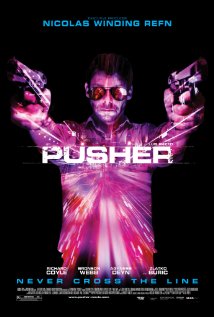
PUSHER
UK, 2012, 89 minutes, Colour.
Richard Coyle, Bronson Web, Zlatko Buric.
Directed by Luis Prieto.
This film is of remake of the original Danish film, Pusher, released in 1996, followed some years later by two sequels. The original film made a mark for its director, Nicholas Winding Refn, who is one of the executive producers of this film.
The plotline is virtually the same as that of the original with a setting now in London (and a shorter running time than the original). Richard Coyle plays Frank, London dealer, confident himself, moving around a seedy London, especially the clubs and various venues for clients and dealers. When pursued by the police, he empties his drugs into the river and, while they interrogate him, they cannot keep him.
As at the first film, he has a friend called Tony (Bronson Web), a motormouth with an excess of sexual fixation. The police say that he informed on Frank and Frank bashes him. Fred is also in debt to an Eastern European dealer, Milo, played by Zlatko Buric who play the same role in the first film, a smiling dealer but ruthless.
This film emulates the visual style of the first film, dark, an ugly picture of London, with a driving score.
Fans of the original film were not the least impressed by this version.
1. The reputation of the original film? Cult film? The beginning of the director’s successful career? The need for and quality of this remake?
2. The London settings, the seedy aspects, the drug world, prostitution, violence, Eastern European criminals, local criminals?
3. The tough style of filmmaking, the story, performances, issues? Visual and forceful? The choice of musical score, music, aggressive?
4. The time span, action over one week, each day specified, the intensity, Frank’s character, situation, his being pursued by criminals demanding money, police investigation, trying to raise money for his debts?
5. Frank, a sociopath, his character? In the world of drugs? His personality, prone to violence? Friendship with Tony? The relationship with Flo? The difficulties of intimacy? Love? His experience in the drug world? Dealing? The stock, on credit? The amount of cash? The police, the investigation? Getting rid of the drugs in the water? Milo and his demands? The police and their not having enough evidence to keep Frank? The ruthlessness of his attempts to raise money?
6. The range of characters, Tony, weak, sex obsession, Flo, her dancing, love for Frank, yet taking the money, criminal friends, the drug bosses, from Eastern Europe? People caught up in this drug world?
7. The character of Flo, as a dancer, sex, personality, the reason for being with Frank? His dealings with her, her love, his lack of emotion in his relationship?
8. Tony, friend, associate, the drugs, sex talk, Frank thinking he had informed to the police, bashing him?
9. Indebted to Milo, the drug lord, his henchmen, standover tactics, electric torture, the types, the brutal stances? Frank getting the gun, getting away? Milo and his smiles and smooth talk, relentless?
10. The end, unfinished, Frank and a future?
11. An ugly world, presented enthusiastically with cinematic verve?
Published in Movie Reviews
Published in
Movie Reviews
Tagged under
Saturday, 18 September 2021 19:51
Chasing Mavericks
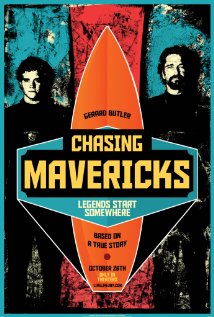
CHASING MAVERICKS
US, 2013, 160 minutes, Colour.
Gerard Butler, Johnny Weston, Elizabeth Shue, Abigail Spencer.
Directed by Curtis Hanson and Michael Apted.
Chasing Mavericks is a rather inspiring film, especially for those who have any interest in surfing.
The film was based on a true story, the life, short life, Jay Moriarty, who trained with an expert surfer, Frosty, who acted as a technical adviser to this film. Jay Moriarty was 15 when he rode a giant wave on the Pacific coast of California. He continued to surf professionally but, sadly, died by drowning while surfing in the Maldives.
Much of the film is about training and surfing, plenty for enthusiasts. And there is some magnificent photography of coastlines, beaches and waves, both small and immense.
In many ways the film is quite straightforward with its presentation of the young Jay, his life with his mother, missing his absent father, finding a father-figure in Frosty, developing his skills, relating to a young friend whom he eventually married, the film highlighting his achievement in riding the wave at such a young age.
Johnny Weston is gently sympathetic as Jay. Gerard Butler is earnest as Frosty. Elizabeth Shue is Jay’s mother. The director was Curtis Hanson, director of some fine thrillers like The Hand that Rocked the Cradle, Bad Influence, Wonder Boys and, his masterpiece, LA Confidential. He became ill at the end of the filming and the direction was taken over by veteran Michael Apted (thrillers like Gorky Park, a number of comedies, but, especially, the Seven Up series).
1. The title, the reference to huge waves? Surfing? Based on the true story? The human dimensions of the story, and adolescent, a father-figure, mentor?
2. The US West Coast, the towns, homes, pizza parlour, the streets? The coast and the crags, rocks, the beaches, the waves, the immensity of the waves?
3. The photography, of the waves, within the waves, the surfers and the rides? The overview of the coast, the waves and beaches? The musical score?
4. The story of Jay Moriarty, as a little boy and his friendship with Kim, rescuing the dog, the bond between them? Jay as an adolescent, living with his mother, love for her, his father’s leaving and his letter, his not opening it until the end, his being introduced to surfing, his feeling at home in the water? The encounter with Frosty, talking, surfing, his house and family, his shed with the equipment, following him on the top of the car, seeing the El Niño waves?
5. The agreement with Frosty, the secrecy about the waves? 12 weeks for him to train? Kim forging the note from his mother? The regime, the roster, on time, paddling, breathing underwater, distance paddling, his chart and his marking off his achievement his achievement? Learning how to serve, balance, positioning of weight, the waves? Jay as a boy, his statistics, timing the waves and his conclusions, Frosty impressed?
6. Jay and his mother, her borrowing money, hard work, love him, frightened when she saw him in the bath, his holding his breath, repayment of the money, her support of him? Her explanation about her husband leaving her but not leaving him? At the end and her knowing about the note and his training?
7. The friendship with Kim, being older, but seeing her as a soul-mate? The meetings with her, the sharing? Listening to Frosty, sharing with his wife? Kim not wanting to be seen with Jay, his being upset, her coming to apologise? The following him in his quest? The marriage, her final grief?
8. Frosty, his demands of Jay, writing essays, their not been good enough, Jay writing about his relationship with Kim, about the waves? His friend getting his book, the young men who had taunted him reading it aloud?
9. His relationship with his friend? Their working at the pizza parlour, introduction to surfing, ups and downs? The adolescents around town, taunting and criticising? Final acknowledgement of what Jay could do?
10. Frosty, his relationship with his wife, his love for her, and knowing about his going to the waves? The children? A wise and patient woman? The discussions with Kim? Admiration for her husband? Her collapse, the stroke, Jay ringing 911? The funeral, Frosty’s grief, his being urged to be a father to his children? His daughter growing up, the baby, the daughter going to the final quest?
11. The effect of the preparation of Jay, Frosty asking what he was afraid of? His final acknowledgement of his fears? Ready for riding the wave?
12. The group going, Frosty not riding, Kim present, the photographers, the friends? The size of the waves? Jay sick on the way? Going out, on the waves, his being overwhelmed, fears that he had been drowned, his emerging, getting a new board from the boats who were keeping watch for safety surveillance,
coming again, riding the wave? The personal triumph?
13. The final information, his continued success, surfing in the Maldives, his drowning? His being a role model for young surfers?
Published in Movie Reviews
Published in
Movie Reviews
Tagged under